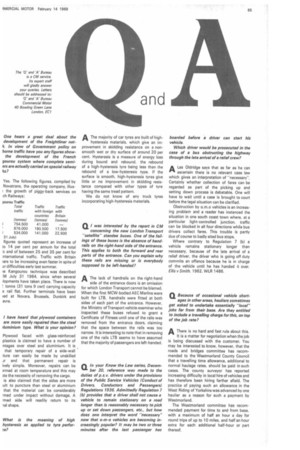a In your Know the Law series, December 20, reference was
Page 67

If you've noticed an error in this article please click here to report it so we can fix it.
made to the duties of p.s. v. drivers under the provisions of the Public Service Vehicles (Conduct of Drivers, Conductors and Passengers) Regulations 1936. Admittedly Regulation 7 (b) provides that a driver shall not cause a vehicle to remain stationary on a road longer than is reasonably necessary to pick up or set down passengers, etc., but how does one interpret the word "necessary" now that o-m-o vehicles are becoming increasingly popular? It may be two or three minutes after the last passenger has
boarded before a driver can start his vehicle.
Which driver would be prosecuted in the case of a bus obstructing the highway through the late arrival of a relief crew?
ALes Oldridge says that as far as he can ascertain there is no relevant case law which gives an interpretation of -necessary". Certainly whether collection of fares can be regarded as part of the picking up and setting down process is debatable. One will have to wait until a case is brought to court before the legal situation can be clarified.
Obstruction by o.m.o vehicles is an increasing problem and a reader has instanced the situation in one south coast town where, at a particular light-controlled junction, traffic can be blocked in all four directions while bus drivers collect fares. This trouble is partly due of course to badly sited bus stops.
Where contrary to Regulation 7 (b) a vehicle remains stationary longer than necessary, because of the late arrival of a relief driver, the driver who is going off duty commits an offence because he is in charge of the vehicle until he has handed it over. Ellis v Smith. 1962. WLR 1486.


















































































































